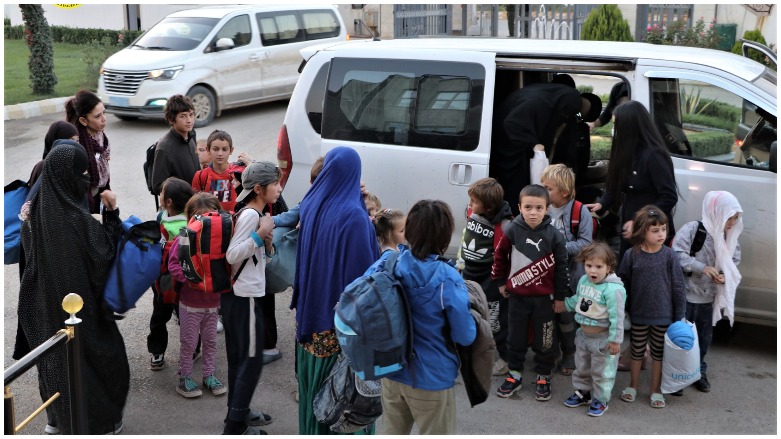Moscow carries out repatriation of Russian orphans from Syria

ERBIL (Kurdistan 24) – The Kurdish-led Autonomous Administration of North and East Syria handed over 30 Russian orphans of parents accused of membership in the Islamic State to Russian officials on Thursday.
It's the sixth time this year that Russia has repatriated orphans or family members connected to Islamic State fighters back to Russia.
Custody of the children was handed over to the office of the Children’s Rights Commissioner for the President of the Russian Federation, Anna Yurievna Kuznetsova, reported the local North Press news agency Thursday.
Following the handover, co-chair of the Administration’s Foreign Relations Department Abdulkarim Omar held a press conference with the head of the Russian delegation, Larisa Nikolaevina.
Thomas McClure, a Syria-based researcher at the Rojava Information Center, told Kurdistan 24 that recent months have seen “four repatriations primarily focused on Russian national orphans being held in North and East Syria.”
McLure added that the most recent transfer is likely due to the recent Russian-sponsored conference in Syria touting the need for normalization for the Syrian government, “supposedly to support the return of Syrian refugees to Syrian Government-held areas despite Assad's abominable human rights record.”
Furthermore, McLure said that the transfer enables Russia to demonstrate that it is playing an active role in dealing with the complex crisis for internally displaced persons (IDP) and refugees in Syria.
Following the emergence of the Islamic State in Iraq and Syria in 2014, thousands of foreign nationals joined the group to fight. Accompanying many of them were women who came from various parts of the world.
Both the US and Syrian Democratic Forces (SDF) have called on countries to bring home thousands of their nationals who joined the extremist organization which the Kurdish-led forces captured in Syria, as Iraq has done on a limited scale.
However, most EU states have been reluctant to bring back Islamic State fighters, women accused of membership, or and their children now stuck in Syria, apart from children like in this instance or urgent medical cases.
Repatriation is also made more difficult due to the fact most EU countries have no military presence on the ground, apart from France.
“A large number of foreign ISIS affiliates in NES (Northeast Syria) are from Russia, while Russia's physical presence in Syria has meant it is easily able to facilitate extensive transfers of its nationals,” McLure added.
According to the Moscow Times, Russia has worked actively to bring back women and children linked to those who fought for the Islamic State in either Syria or Iraq under a program led by Chechen leader Ramzan Kadyrov and with support of Russian president Vladimir Putin. Many, though, still remain.
Last year, Russia also collected DNA of 100 children in Syria thought to be of Russian parents for possible resettlement.
“Nonetheless, Russia's willingness to take back its own ISIS-linked nationals should serve as a reminder to Western governments that they, too, have a responsibility to act over their own foreign nationals being held in NES (Northeast Syria),” McLure concluded.
Editing by John J. Catherine
